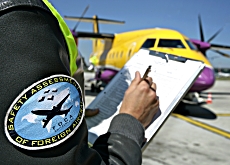
Flying is still the safest way to travel

Four aeroplane crashes in August have prompted renewed concerns about the safety of air travel. But aviation experts say flying has never been safer.
The Swiss government announced this week that it would shortly be publishing on the internet a blacklist of airlines banned from Switzerland.
The move comes after demands from consumer-protection groups, and reflects growing public concern over aviation safety. In August some 340 people died in plane crashes.
“Flying today is as safe as it ever was, if not safer,” Anton Kohler, spokesman of the Swiss Federal Civil Aviation Office, told swissinfo.
It has long been common knowledge that flying is statistically safer than driving, travelling by train or ship, or even taking a walk.
Indeed, despite the recent spate of accidents, the year to date ranks among the safest in the history of air travel. A total of 450 lives were lost worldwide in 2004.
In comparison, the number of deaths caused by road accidents in the European Union alone was well over 50,000 a year until 2004, when it dropped slightly.
Random Inspections
Kohler said public concerns that the growing number of low-cost airlines were compromising safety were unfounded.
“Discount airlines in Switzerland, Europe and the United States are obliged to meet the same safety standards as other airlines,” he explained.
These standards also applied to Cyprus-based Helios. A plane belonging to the carrier crashed into a mountain near Athens on August 14, killing everyone on board.
Helios was one of the airlines tested by Swiss aviation authorities. “It was not a scrap fleet,” emphasised Kohler. “At the SAFA checks, Helios came out well.”
SAFA, or Safety Assessment of Foreign Aircraft, is a programme of the Paris-based European Civil Aviation Conference (ECAC). It permits random inspections of foreign aircraft which land inside another country’s territory.
“In Switzerland we do about 200 random inspections per year,” said Kohler.
Europe-wide, over 4,500 foreign aircraft were monitored under ECAC auspices in 2004.
Moreover, SAFA checks take place in addition to air-safety oversight measures that are organised at a national level.
“Safety in air travel lies above all in the fact that airlines and airplanes are inspected in the lands in which they are registered,” explained Kohler.
In addition to overseeing Swiss airlines such as Swiss, Belair, Edelweiss or Helvetic, the civil aviation office also undertakes advance inspections of the approximately 300 foreign airlines that wish to fly into Switzerland.
Inspections include checks that airlines are in possession of the required national authorisations, necessary insurance and that adequate safety-management measures are in place.
Barred airlines
Only if all the aforementioned criteria are in place is a foreign airline granted a five-year permit to operate in and out of Switzerland.
Not all airlines pass the test: at the moment 18 airlines or planes are barred.
Mostly it is individual aircraft that are blacklisted. But in the worst case an entire fleet might be barred.
As of next week, the government will be publishing the blacklist on the internet. At the moment the only way to obtain blacklisted information is by submitting a written request listing particulars of individual airlines.
Harmonisation
Under the direction of the new Cologne-based European Aviation Safety Agency (EASA), safety standards within Europe will gradually be harmonised and national authorities will be responsible for implementing the new rules.
Aside from the development and codification of safety standards in European air travel, the EASA will also decide upon the certification of large passenger planes.
This should lead to the EASA becoming a counterpart in Europe to the powerful Federal Aviation Agency (FAA) in the United States.
Switzerland is fully integrated within the EASA. “We are de facto represented in all the working groups and work actively with other members,” said Kohler.
There is a caveat, however: “Full EASA membership for Switzerland is not possible, because we’re not in the European Union.”
Each country is responsible in the first instance for the safety of its airlines.
In Switzerland the Federal Civil Aviation Office is in charge of air safety.
Inspections of foreign airlines, known as SAFA checks, are carried out by the civil aviation office, under the auspices of the Paris-based European Civil Aviation Conference (ECAC).
The new Cologne-based European Aviation Safety Agency (EASA) is gradually harmonising air-safety standards in Europe.
The EASA will eventually play a role in Europe similar to that of the influential Federal Aviation Agency (FAA) in the United States
(Adapted from German by Kathleen Peters)

In compliance with the JTI standards
More: SWI swissinfo.ch certified by the Journalism Trust Initiative


















![The four-metre-long painting "Sonntag der Bergbauern" [Sunday of the Mountain Farmers, 1923-24/26] had to be removed by a crane from the German Chancellery in Berlin for the exhibition in Bern.](https://www.swissinfo.ch/content/wp-content/uploads/sites/13/2025/12/01_Pressebild_KirchnerxKirchner.jpg?ver=1ea8acae)











You can find an overview of ongoing debates with our journalists here . Please join us!
If you want to start a conversation about a topic raised in this article or want to report factual errors, email us at english@swissinfo.ch.